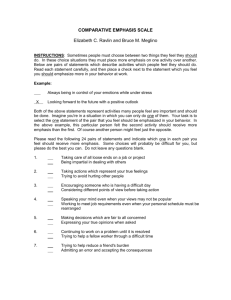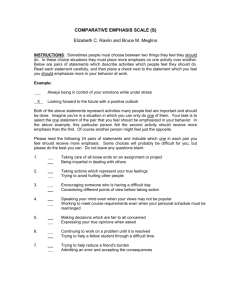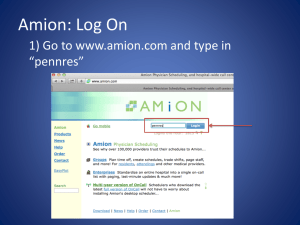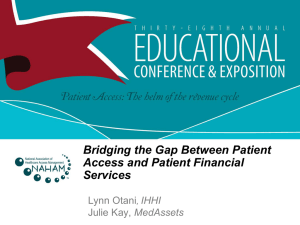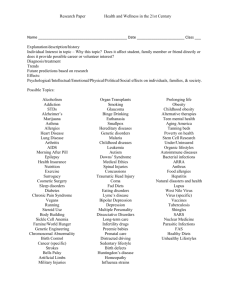DLVE-SLP - Longwood University
advertisement
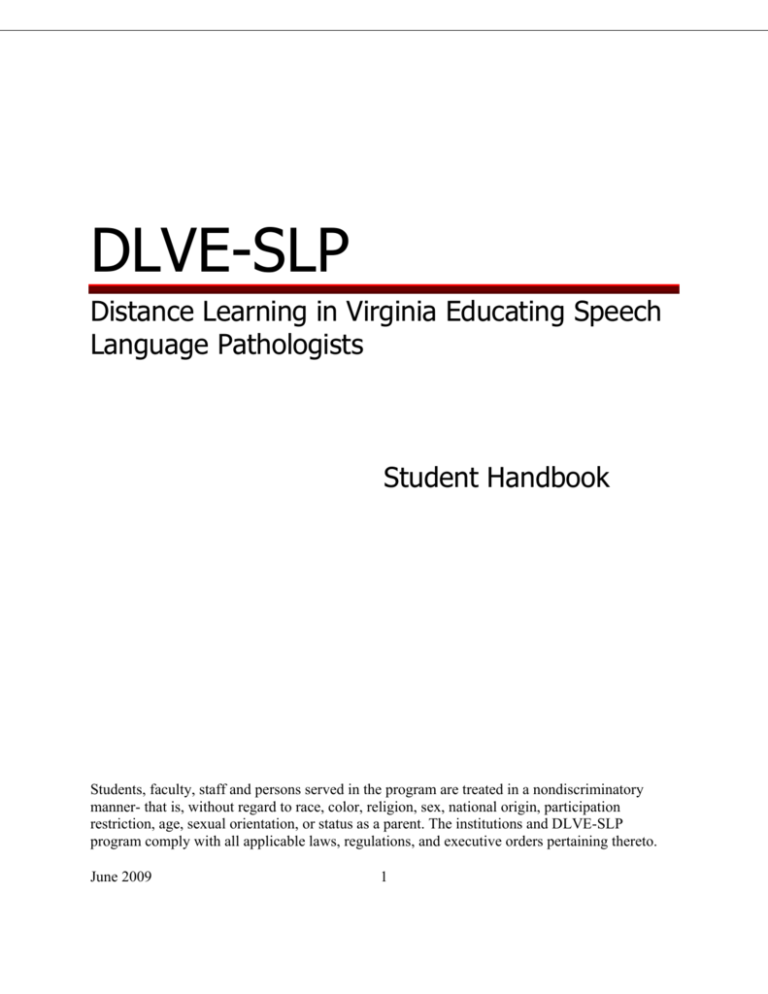
DLVE-SLP Distance Learning in Virginia Educating Speech Language Pathologists Student Handbook Students, faculty, staff and persons served in the program are treated in a nondiscriminatory manner- that is, without regard to race, color, religion, sex, national origin, participation restriction, age, sexual orientation, or status as a parent. The institutions and DLVE-SLP program comply with all applicable laws, regulations, and executive orders pertaining thereto. June 2009 1 Table of Contents Overview…………………………………………………………………………………………………………………Page 3 Mission Statement Program History Program Information……………………………………………………………………………………………..Page 4-6 General Information Tuition Assistance Library Access Email Textbooks Program Announcements/Communication Honor Code Face-to-Face On-Site Program Requirements Grievance Policy Transfer Policy Curriculum………………………………………………………………………………………………………………Page 7-8 Advising Program of Study Grading Credit Transfers Course Syllabus Instructional Faculty Comprehensive Exams Remediation Plan Coursework Delivery…………………………………………………………………………………………….Page 9-11 Registration Coursework Calendar Technical Requirements Software Requirements Technical Support Methods of Delivery Coursework Concerns DLVE-SLP Course Description………………………………………………………………………………Page 11-14 DLVE-SLP Curriculum…………………………………………………………………………………………….Page 15 DLVE-SLP Clinical Practicums…………………………………………………………………………………Page 16 Clinical Clock Hours Practicum Sites Dress Code Additional Practicum Information Insurance Appendix A: ASHA Code of Ethics June 2009 2 Mission Statement: DLVE-SLP, a distance education program, will increase the number of SLP graduates meeting ASHA certification standards who will provide services in VA public schools. History of DLVE-SLP The Distance Learning Consortium project was initiated in 2005 due to the ongoing shortage of certified speech language pathologists available for employment within the Virginia public school systems. Discussions, under the direction of Dr. Carol Dudding, were conducted with Virginia universities offering programs in Communication Sciences and Disorders and the Virginia Department of Education (VDOE) to determine if an on-line Master’s degree program was feasible to assist students who were unable to participate in a traditional on-site program. In June 2005, the Distance Learning Consortium emerged after an intensive collaborative meeting between interested universities and the VDOE. The VDOE approved funding to further develop the program. Over the next year, representatives from Hampton University, James Madison University, Longwood University, Norfolk State University and the University of Virginia met regularly to develop a curriculum, determine admission criteria and obtain the necessary accreditation from state, regional and national agencies. Through ongoing collaboration among participating universities, the project continued forward with a target initiation date of courses to begin in the summer of 2007. In February 2006, the project became known as DLVE-SLP: Distance Learning in Virginia Educating SLPs. The project began actively marketing the program in early 2006 for prospective students and certified speech language pathologists to provide supervision. In early 2007, DLVE-SLP received approval from the Council of Academic Accreditation of the American Speech Language Hearing Association and the Southern Association of Colleges and Schools. The program began accepting candidacy applications and subsequent applications into individual universities in January 2007. The first cohort of students, admitted into one of the admitting universities, began courses in June 2007 and will graduate in 2010. A special thank you is extended to VDOE and the dedicated educators who devoted many hours to the development and continuation of the DLVE-SLP program. June 2009 3 DLVE-SLP Graduate Program Information General Information Each student is participating in DLVE-SLP by admission into an accredited university participating in the DLVE-SLP program. As a result, students will be required to meet all program requirements as determined by their admitting university. While the DLVE-SLP core curriculum will be delivered across universities, students must be aware that they may need to complete additional courses and requirements specific to their admitting university. DLVE-SLP requires students to adhere to respective admitting universities policies regarding tuition assistance, honor code, registration and all other policies. Tuition Assistance Tuition assistance, provided through Virginia Dept. of Education, is available to Virginia resident students who sign an Agreement of Obligation form and commit to working in the VA public schools after degree completion. The student will be responsible for working within VA public schools as a master’s level speech language pathologist one year for every year of tuition assistance receipt by the DLVE-SLP student. If upon degree completion, the student is unable to follow through with any portion of the time owed to the schools, then the student will be obligated to reimburse the appropriate tuition assistance funds back to the university.. Additionally, students who discontinue the DLVE-SLP program prior to degree completion will be obligated to repay all tuition assistance funds received while participating in DLVE-SLP to the university. Students will not be eligible to receive tuition assistance beyond the three year (9 semesters) DLVE-SLP intended program of study. Tuition assistance is not guaranteed and is pending available VDOE funding. Students may not receive additional financial support from VDOE sources. However, students are encouraged to seek additional financial support from their specific localities (i.e. local schools) if available. Tuition assistance administration will be managed through the admitting university. Therefore, the admitting universities policies regarding tuition support disbursement and continuation of tuition support should be reviewed carefully within your admitting university handbook. Library Access All DLVE-SLP students will be provided library resources through James Madison University’s online services as well as through the admitting university. Students should become familiar with the resources available to them. There is additional information regarding library resources and interlibrary loan services within Blackboard. Email In addition to email accounts through the admitting university, students will be provided an email address at James Madison University while enrolled in the DLVE-SLP program. DLVE-SLP requires all students to utilize their JMU academic email address for correspondence throughout the program. Students are strongly encouraged to forward other email accounts, including admitting university, to a central account that is readily accessible utilizing the forwarding option to other June 2009 4 email address as needed. However, all information relating to DLVE-SLP will be provided through your JMU academic email accounts. Therefore, it will be your responsibility to ensure that you check it regularly or appropriately forward to another account if needed. Textbooks Students are responsible for the purchase of textbooks related to the courses. A list of texts will be made available to you prior to the beginning of each course and will be available on the DLVE-SLP organization Blackboard™ site and on course syllabi for your reference. Please take special note of the ISBN number to be sure that you purchase the correct edition. Students may purchase textbooks through online sources such as: www.amazon.com or www.barnesandnoble.com . When purchasing textbooks through online vendors, please be sure that the correct text edition is purchased and that any accompanying discs are received with the text. Allow time for delivery and back order delays. Program Announcements/ Communication Communication is a key aspect to success in any distance education program. Students will be expected to log into the DLVE-SLP organizational site in Blackboard™ and actively participate in discussions and keep current with program information. Faculty and coordinators will communicate information on the site regarding the DLVE-SLP program, provide collaborative discussion opportunities and university specific discussion opportunities. The site will also provide access to important reference documents and program forms. You may log in at: https://blackboard.jmu.edu/. Honor Code DLVE-SLP students will strictly adhere to the honor code policies per the admitting university. Faculty will report suspected violations to the appropriate committee within the student’s admitting university. Penalties for honor code violations will be at the discretion of the admitting university. Resulting penalty decisions by the admitting university will be considered final and upheld by the DLVE-SLP program. Face-to Face / On-site Program Requirements DLVE-SLP students are required to attend an on-site 2-day orientation before the initiation of coursework and to attend a program meeting each year thereafter for program updates as deemed necessary. In addition to the program orientation and yearly meeting requirements, students will be required to participate in at least one on-site clinical practicum. The specifics of the requirement vary by university and students are encouraged to begin planning for this requirement immediately. Students are responsible for expenses related to attendance at the programs. Students may also be required to complete coursework not offered through DLVE-SLP on-site to meet the admitting university’s curriculum requirements. Please refer to the admitting university curriculum regarding courses required outside of DLVE-SLP offerings. Check with the admitting university for additional requirements for onsite attendance. June 2009 5 Grievance Policy Students who experience issues or concerns regarding policies and procedures concerning DLVE-SLP should: 1. Discuss the situation with the DLVE-SLP On-site Coordinator at the admitting university. If satisfactory resolution is not achieved, then: 2. Consult with the DLVE-SLP Program Coordinator (Ms. Drulia) and the Project Manager (Dr. Dudding). If satisfactory resolution is not achieved, then: 3. The DLVE-SLP Consortium will review the case and will make the final decision related to the student issue. Students are required to utilize the grievance policy of the admitting university for issues or concerns related to policies of the university such as grades, tuition, registration, academic requirements for graduation, etc. Transfer Policy Students interested in transferring to another university within DLVE-SLP will need to apply to the university according to the prospective university policies for admission consideration. Students are cautioned that the university policies regarding transferring of credits from another institution will apply. Acceptance of transfer is not guaranteed and may result in the loss of earned credits. June 2009 6 DLVE-SLP Curriculum Advising Students will be assigned an advisor through the admitting university. The advisor will be available to assist the student in successful completion of the Master’s degree requirements specific to the admitting university. Therefore, students are encouraged to solely seek information regarding their program through their respective academic advisor to ensure accurate information is provided to you. Advisor contact information is located within your admitting university handbook. In most situations, the on-site coordinator will be the DLVE-SLP advisor. Program of Study The DLVE-SLP program is a three year part-time program with an average of 6-9 credits per semester (may vary depending upon university). The program will begin in June 2009 and complete in August 2012. The program is inclusive of clinical practicum experiences and meets all requirements for ASHA certification. DLVE-SLP course information and a course description are provided within this handbook and on the DLVE-SLP website for your reference. (www.dlve-slp.org) Grading Students may view grading information for DLVE-SLP courses in Blackboard. Faculty will assign a numeric number and can assign a recommended letter grade. The final grade is determined by the policy for the university in which the student is enrolled. An unsatisfactory grade may result in a student having to retake a course. In this case, it will not be made available online. Students should be aware that grades may affect tuition support and funding. Grades of INCOMPLETE are strongly discouraged and might not be approved by faculty or the admitting university. Students wishing to consider a grade appeal for a DLVE-SLP course should follow their admitted university guidelines. Credit Transfers The transferring of credits from another university for credit of a course within DLVE-SLP is at the discretion of the admitting university. Please consult with your on-site coordinator/advisor at your admitting university. Course Syllabus Students may access a course syllabus within Blackboard™ once the course is opened and the student is registered. The course syllabus will contain the course description, objectives, textbook information and course timelines. June 2009 7 Instructional Faculty Courses will be taught by experienced doctoral level faculty. A strength of the DLVE-SLP model is that students will have access to instructors from across the nation with advanced expertise. Students should be aware that teaching style, methodologies and expectations will vary across faculty. Comprehensive Exams DLVE-SLP students will complete comprehensive exams according to the student’s university guidelines. Remediation Plans Students who are unable to master competency in a given area will be subject to a remediation plan. The remediation plan will be established by the teaching faculty in consultation with the admitting university. Students must work with the faculty member who established the plan to complete it in the manner outlined. The on-site coordinator will serve as a liaison when warranted. June 2009 8 Coursework Delivery Registration Students will register for courses per admitting university policies. Students should consult with their advisor/ on-site coordinator regarding the process for registering for courses within their university. Coursework Calendar Coursework offered within the DLVE-SLP program may not follow the calendar of the admitting university. The calendar is determined by the following guidelines: Courses Begin: Courses End: Breaks: Latest begin date of the universities Earliest end date of the universities Determined with majority of the universities or at the discretion of the professor Courses will generally run for 13-14 weeks. Students should plan to be actively involved in the program over the next three years. Plan accordingly. The academic calendar will be posted within Blackboard™ DLVE-SLP organization site for your reference. Courses will be offered one time within the three year cohort. Students are required to complete the DLVE-SLP courses within the provided sequence. Technical Requirements Students should beware that participation in this program requires access to certain minimal technologies including computer with high speed access to the internet. Please refer to these suggested minimum requirements. PC Minimum Requirements Macintosh Minimum Requirements * 128 MB RAM * 500 Mhz Processor * 5 Gb Hard Drive * Reliable High Speed Internet Connection * Windows 98 * Virus Protection with latest definitions * Latest Operating System Patches Recommended Requirements * 128 MB RAM * 500 Mhz Processor * 5 Gb Hard Drive * Reliable High Speed Internet Connection * Mac OS 9.2 * Virus Protection with latest definitions * Latest Operating System Patches Recommended Requirements * 256+ MB RAM * 1.2 Ghz Processor June 2009 * 256+ MB RAM * 1.2 Ghz Processor 9 * 25 Gb Hard Drive * Windows XP Service Pack 2 or higher * Speakers/Headphones * 25 Gb Hard Drive * Mac OS X.3.6 (10.3.6) * Speakers/Headphones Software Requirements: Students are recommended to utilize Microsoft Office 2003 or later, including Word, Powerpoint and Excel. You will also be required to download Adobe Acrobat Reader, Windows Media Player and /or Java Script plug-ins. Students may have access to these software applications through their admitting university. Students are also required to utilize an updated anti-virus program to protect other computer users in the program. Follow the requirements of the admitting university for safe computing practices. Technical Support DLVE-SLP students who experience difficulties with JMU email or Blackboard™ during the program should seek assistance through the James Madison University Help Desk at: http://www.jmu.edu/computing/helpdesk/ . Students may update passwords for James Madison University accounts at https://accounts.jmu.edu/login/ . All other computing issues should be addressed through the admitting university. Methods of Delivery DLVE-SLP courses will be delivered through a variety of distance learning technology currently available. This will primarily involve use of the internet. To enhance instructional practices, faculty will deliver courses via synchronous and asynchronous teaching methods. Faculty recognize that DLVE-SLP students are employed and require flexibility with the instructional schedule; however, the faculty may require a synchronous class discussion/lecture/assignment if deemed necessary for adequate learning of a specific topic. Coursework Concerns Students enrolled in DLVE-SLP courses are expected to communicate directly with faculty should they have a concern with course content, an assignment or a grade. In the event that a student is unable to resolve a concern with a faculty member, then the student is expected to contact their admitting university on-site coordinator/advisor for assistance in a resolution. Students must also adhere to the admitting university policies regarding a concern with a course or a grade appeal. In the event that the on-site coordinator, student and faculty member are unable to reach a resolution, the on-site coordinator will consult with the Program Coordinator, Grant Manager and Advisory Board as deemed appropriate to reach a resolution. June 2009 10 Students are encouraged to complete a course evaluation at the completion of each DLVE-SLP course. Course evaluations will be made available through Blackboard™. Evaluations are completed anonymously and will assist DLVE-SLP in program performance. Information provided in course evaluations is reviewed by the DLVE-SLP Advisory Board. DLVE-SLP students have the right to appeal a received grade. Students are advised to consult with their on-site coordinator for guidance on the appeal process within the student’s university. June 2009 11 DLVE-SLP Course Description Students should be aware that course titles, numbers and number of credits will vary according to the curriculum of the admitting university. Not all courses are required by all university programs. Below is a general description of the courses that will be made available through DLVE-SLP. Research in Communication Sciences & Disorders This course focuses on basic and applied research interpretation. Covers basic knowledge needed as a speech-language pathologist for assessing clinical research to inform clinical decisions. Observation & Methods Seminar This seminar is designed to provide directed/guided observation of the clinical process (interview, evaluation, and treatment sessions). Practical clinical methodology will be emphasized. Neurological Development & Disorders Across the Lifespan This course focuses on neurological structures and functions related to speech, language, and hearing processes. Disorders of the nervous system, their location and how these disorders affect speech and language behaviors will be examined. Embryological development and craniofacial pathologies are also studied. Speech & Hearing Science This course examines principal concepts and procedures for the study of physiologic, perceptual, and acoustic aspects of voice, speech and hearing. Language Disorders I This course focuses on the nature, prevention, assessment and treatment of language impairments in children (infant through preschool). Coverage includes interdisciplinary assessment, early intervention planning, implementation of intervention, and consideration of the role of speech language pathologist as a team member. Autism spectrum disorders, preliteracy skills, and cultural and linguistic diversity will be also be discussed. Language Disorders II This course focuses on the nature, prevention, assessment and treatment of language impairments in children (school-age through adolescent). Coverage includes interdisciplinary assessment, intervention planning, implementation of intervention, and consideration of a variety of service delivery models. Literacy acquisition as well as cultural and linguistic diversity will be also be discussed. Articulation & Phonological Disorders This course studies etiology, evaluation, and treatment of articulatory and phonological disorders. Articulatory phonetics, phonological processes and coarticulation are considered. Dysphagia This course focuses on assessment and treatment strategies for infants, children, and adults with feeding and/or swallowing disorders. Normal neurophysiology of deglutition, clinical and radiographic assessment, and therapy management will be addressed. June 2009 12 Motor Speech Disorders This course studies apraxia of speech and dysarthrias in children and adults, including etiology, differential diagnosis, and appropriate management techniques. Ethics and Professional Issues Module This course/module involves students in discussions regarding the ASHA Code of Ethics, including ethical decision-making. The course also includes a discussion of contemporary professional, multi-cultural, and legal issues with respect to clinical practice. Aphasia & Related Disorders Scientific, theoretical, and clinical considerations of neuro-cognitive disorders in the adult. Symptomatology, diagnosis, and rehabilitation of disturbed processes in comprehension, spoken and written language will be addressed. Public School Methods Administration and delivery of clinical services to communicatively disordered children and adolescents, including current regulations and professional issues. Disorders of Fluency Theories of causation, evaluation, and management of fluency disorders in children and adults are studied. Coverage includes differentiating incipient stuttering from normal disfluencies and the impact stuttering can have on interpersonal relationships. Aural Rehabilitation This course focuses on the impact of hearing loss on human communication across the lifespan. Includes the latest in hearing technology and principles of aural (re)habilitation for individuals who are deaf, hard-of-hearing, or experience disorders of auditory processing. Hearing conservation is also discussed. Voice Disorders An in-depth study of laryngeal function and disorders, including anatomical and physiological bases for normal voice production as well as functional, organic and neurogenic voice disorders. Theories and methods of research, diagnostic evaluation, and treatment of voice disorders are discussed. Resonance Disorders This course examines cleft lip, cleft palate and other orofacial abnormalities and their associated speech disorders. Theories and methods of research, diagnostic evaluation, and treatment of resonance disorders are discussed. TBI An overview of the role of the speech-language pathologist in the interdisciplinary management (assessment, treatment, and counseling) of cognitive-communicative deficits associated with traumatic brain injury. Multicultural Perspectives in Communication Sciences & Disorders This elective course addresses contemporary issues (e.g., prevalence of communication disability, availability of services, social and cultural restrictions, socioeconomics, health disparities, global views, etc.) which pertain to the promotion and delivery of speech-language June 2009 13 pathology and audiology services, specifically, to individuals from socially, culturally, ethnically and/or linguistically diverse backgrounds. This course advocates for the development of cultural competency as a basic requirement for the provision of communication disorders services as well as to comply with ASHA’s code of ethics. Alternative & Augmentative Communication Assessment and intervention strategies for individuals with limited or nonfunctional speech will be presented. Students will participate in demonstrations of alternative communication systems. An interdisciplinary team approach to (re)habilitation will be studied. June 2009 14 DLVE-SLP 2009 Cohort Course Offerings Chart Equivalent Course Numbers DLVE-SLP Course Professor Research in CSD 1 Neurological Development & Disorders Across the Lifespan 2 Speech & Hearing Science 2 Host University Hampton JMU Longwood Sequence R. Robey UVA 501 500 EDUC 502 Summer 09 C. Dudding JMU 431 604 455 Summer 09 600 605 450 Fall 09 520 Fall 09 525 Spring 10 489 Spring 10 I. Barrow Child Language Disorders I 1 J. Hilton UVA TBD 528, 530 Child Language Disorders II 1 P. Agee Longwood U 621 640 T. Freeman Hampton U Articulation & Phonological Disorders 1 D. Wilkerson Hampton U 612 623 522 Spring 10 Dysphagia (child & adult) 1 C. O'Donoghue JMU 628 544, 625 610 Summer 10 L. PowerdeFur Longwood U. 618 530 Summer 10 M. Norman Longwood U 625 560 542 Summer 10 Aphasia & Related Disorders (cognitive based) 1 R. Robey UVA 603 641, 527 615 Fall 10 Traumatic Brain Injury 2 I. Barrow 522 620 Fall 10 632 575 Spring 11 565 Spring 11 656 625 Summer 11 651 630 Summer 11 595 Summer 11 Observation & Methods Ethics & Professional Issues Module Motor Speech Disorders 2 Disorders of Fluency 2 Public School Methods [elective] 2 C. Runyan JMU L. Power deFur Longwood U 507 Voice Disorders 1 C. Ludlow Resonance Disorders 2 C. Runyan JMU R. Jones NSU 635 B. Seal JMU 529 515 540 Fall 11 F. Loncke UVA 630 529 640 Spring 12 Multicultural Perspectives in CSD Module [elective] Aural Rehabilitation2 Alternative & Augmentative Communication 2 1 Courses traditionally offered by all 3 IHEs 2 Courses offered by 2 or fewer IHEs June 2009 15 606 DLVE-SLP Clinical Practicums Clinical Clock Hours Students will be expected to complete the required clinical clock hours as outlined by the American Speech Language Hearing Association (ASHA) and the admitting university. Students will complete a minimum of 400 clinical clock hours with a minimum of 375 of direct clinical hours and 25 observation hours. Students are expected to keep records of completed clinical hours. DLVE-SLP will not keep records of completed clinical hours. Students must adhere to policies and procedures of the admitting university for obtaining and documenting clinical clock hours. For additional information, refer to your on-site coordinator, DLVE-SLP Blackboard ™, ASHA website and/or Virginia Department of Education website. Practicum Sites Students will coordinate and plan practicum experiences with the assistance of the admitting university on-site coordinator or advisor. Clinical practicum experiences must be under the direct supervision of a state licensed/accredited and ASHA certified speech language pathologist. Dress Code DLVE-SLP students must adhere to the admitting university policies regarding appropriate dress during clinical practicum experiences. Violations of policies will be taken seriously with appropriate penalties imposed per the admitting university. Additional Practicum Information Many clinical practicum sites will require students to have completed CPR training, complete a medical evaluation including TB testing and Hepatitis B vaccinations, and complete infection control coursework. Students are encouraged to consult with their on-site coordinators/advisors for further information regarding these issues. Costs related to their completion will be at the student’s expense. Insurance Students are encouraged to obtain student professional liability insurance prior to beginning of clinical practicum experiences. Insurance premiums will be at the student’s expense. Students may obtain more information regarding insurance through NSSLHA at www.nsslha.org or search for an independent insurer. June 2009 16 DLVE-SLP HANDBOOK I have received my DLVE-SLP program handbook. I have read the handbook in the entirety. I understand the policies and procedures outlined in the DLVE-SLP program handbook and understand that I am responsible for updating the information in the handbook as it is made available. The program is guided by the principles put forth in American Speech Language Hearing Association Code of Ethics. High standards of ethical behavior are expected of students in all situations. Students are expected to report errors, and to acknowledge lack of preparation or knowledge that impacts performance. Any form of cheating or lying, as well as withholding information about unprofessional or unethical behavior of peers in unacceptable. This code of behavior includes accurate reporting of clinical hours. Unethical or unprofessional behavior is sufficient cause for withdrawal from the program. _________________________________ Print Student Name ____________________________ Student Signature ____________________ Date ***Please sign and return to the Program Coordinator prior to June 12, 2009 June 2009 17
